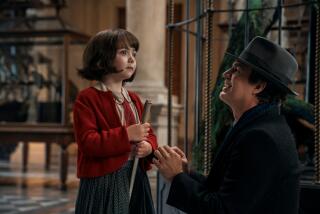To Get Inside the Silence, Lesser Gods Must Give Up Their Control of the Deaf
Perhaps the title of my play “Children of a Lesser God” speaks to the turmoil at Gallaudet University, where the predominantly hearing board of trustees finally selected a deaf president after a week of student marches and rallies demanding that the board change its initial decision in favor of a hearing president. The students had won, after being told for many years that the day is nigh when a deaf person would ascend to the presidency of that august institution of learning in deaf culture.
My play also was about a conflict between the deaf and the hearing world. Often audiences and reviewers have assumed that the title implies that the deaf are some aberration of some bumbling (and no doubt hearing) paternalistic deity and that I am looking from the heights of the “right” world (the hearing world) down on these unfortunates.
In fact, the title has to do with a reference to a Tennyson poem and the two lesser gods in the play, the hearing teacher James Leeds and the profoundly deaf student Sarah Norman. On their first date, Sarah asks James to tell her why he became a teacher of the deaf; he says essentially that he wants to “help” other people. She infers that he views himself as a god of sorts, with all the manipulative and shaping force of that office. She takes him to task for what she assumes (correctly) is his desire to “make me over in your image.” Through the course of the play it becomes clear that each of these intelligent, powerful, egotistical people wants to make the other over in his/her image of what he/she is adamant that the other should/must/ought to be.
Such thinking foreshadows conflagration, in drama as well as in life, and this god-playing explodes following a speech that Sarah writes in protest over the hiring practices of her paternalistic institution (run by “Hearies”). Her speech in part says this: “For all of my life I’ve been the creation of other people. The first thing I was ever able to understand was that everyone was supposed to hear but I couldn’t and that was bad. Then they told me that everyone was supposed to be smart but I was dumb. Then they said, oh no, I wasn’t permanently dumb, only temporarily. But to be smart I had to become an imitation of the people who had from birth everything a person has to have to be good. Ears that hear, mouth that speaks, eyes that read, brain that understands. Well, my brain understands a lot. And my eyes are my ears and my hands are my voice and my language, my speech, my ability to communicate is as great as yours . . . . But for all of my life other people have spoken for me. She says. She needs. She wants. As if there were no ‘I,’ as if there were no one in here who could understand. Until you let me be an individual, an ‘I’ just as you are, you will never truly be able to come inside my silence and know me. Until you can do that I will never let myself know you. Until that time we cannot be joined, we cannot share a relationship.”
Out of this speech, James Leeds abjectly humiliates Sarah Norman for her deafness, for her inability to speak, for her inability to become the single thing that she never, ever can become--a hearing person--but most of all he humiliates her because she has the gall to demand her rights, her equality, her individuality. He tells her: “Grow, Sarah, but not too much. Understand yourself, but not better than I understand you. Be brave, but not so brave that you don’t need me anymore.”
The ending of the play leaves open the possibility that James and Sarah will try again, because they have learned that they have treated each other with resounding impropriety and that they must honor each other’s right to grow to be different from the other.
I admire the bravery of the students at Gallaudet, who demanded that we stop trying to make them in our less-than-perfect image and give them an authentic and unequivocal opportunity to participate in the future direction of their university. Their passion is surely no less viable than that many of us--perhaps even some members of Gallaudet’s board of trustees--felt and exhibited during the tumultuous 1960s and ‘70s when a generation of students and minorities felt that we’d had enough of being spoken for by people who, we were convinced, were not serving us any better than we could serve ourselves.
Every instinct in me says that the board of trustees of Gallaudet University had to stop treating these students as the administrator of the institution in my play treats Sarah Norman and those whom she represents. “I won’t continue in this field,” he says, “if the subjects of my efforts are going to tell me how to minister to them.” Yet he offers to make a settlement with the students. He’ll hire a new deaf gym teacher and a new deaf dietitian. He’s told that that’s not enough. “Wanna know a secret?” he asks. “Nothing would be. Nothing would be enough.”
Well, I tend to agree that ultimately nothing quite completely slakes our endless thirsts, but, like Sarah Norman, I think that the deaf have a very long way to go before they begin to suffer that surfeit. It’s time all of us lesser gods at the controls let them get started.
More to Read
The biggest entertainment stories
Get our big stories about Hollywood, film, television, music, arts, culture and more right in your inbox as soon as they publish.
You may occasionally receive promotional content from the Los Angeles Times.










